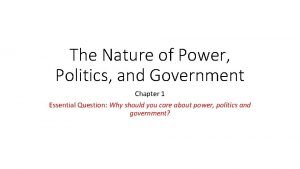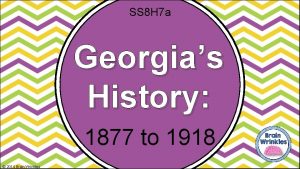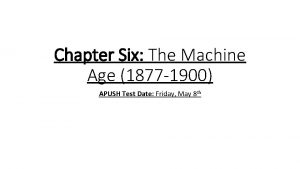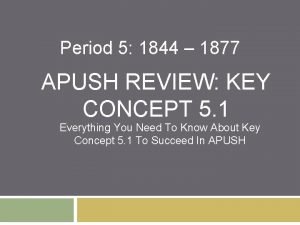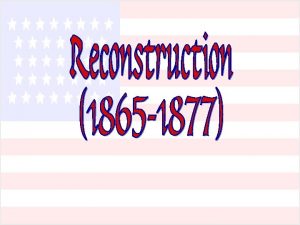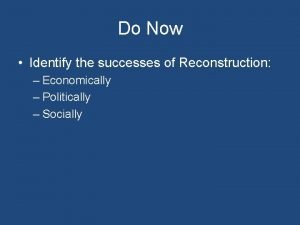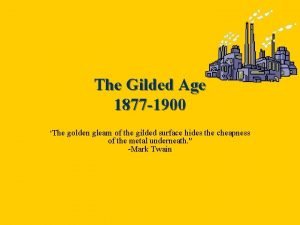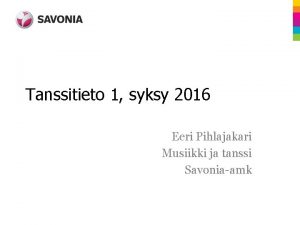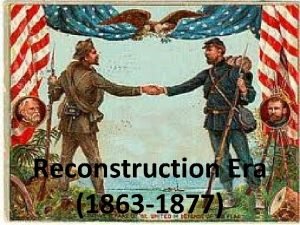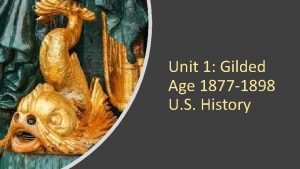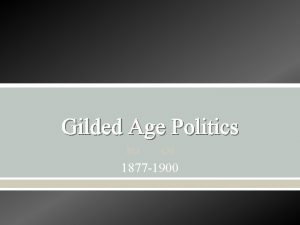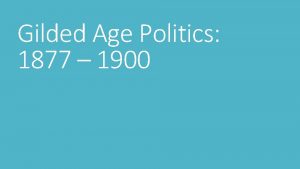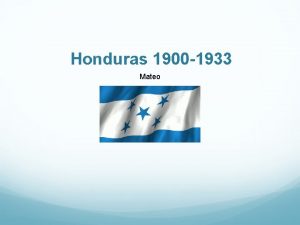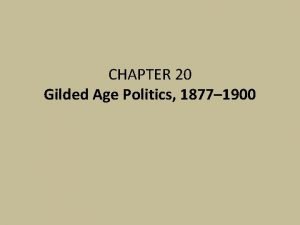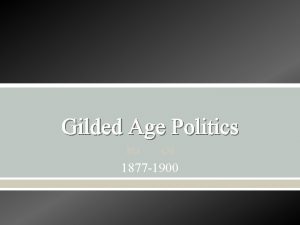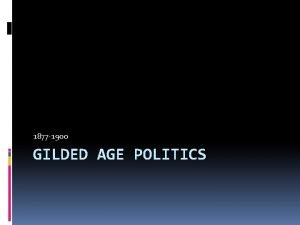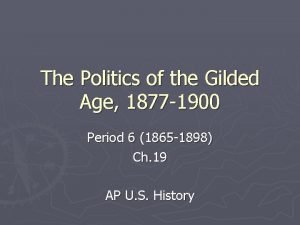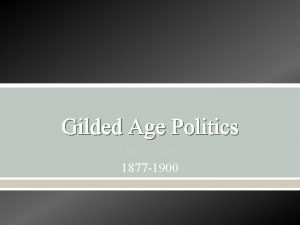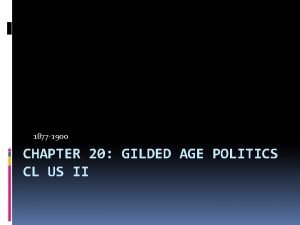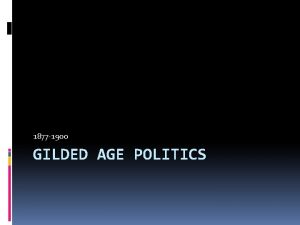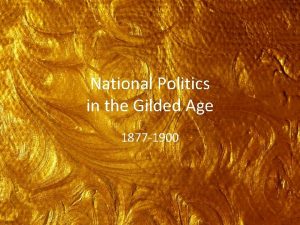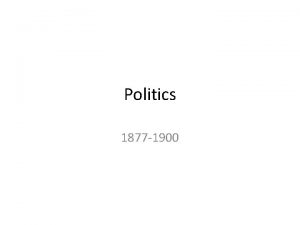Politics and Government 1877 1900 Nature of Politics














- Slides: 14

Politics and Government 1877 -1900

Nature of Politics • Parties ran elections (no secret ballot) • Solid voting blocks • Few “swing states” • Party bosses ran “political machines” Boss Tweed ran Tammany Hall

Party Changes Republicans (GOP: Grand Old Party) • North, Midwest • Scandinavian, German = skilled immigrants • Blacks • “Bloody shirt” appeal against immigrants Democrats • South • Urban NE (unskilled immigrants) • Catholics • “personal liberties” (except for Blacks, Chinese, Indians)

Election of 1876 Compromise of 1877 • Tilden (Dem) anti-Tammany Hall vs. Hayes (Rep) bureaucratic reform • Tilden won popular vote • Election disputed • Compromise of 1877: Withdraw federal troops, South would not dispute elections = ended Reconstruction • Only election settled by federal commission

Limitations to Effective Government

• Weak Presidency Rep Dem – Andrew Johnson (impeachment) – Ulysses Grant (corruption) – Rutherford B. Hayes (1877 -1881) – James A. Garfield (1881) – Chester A. Arthur (1881 -1885) – Grover Cleveland (1885 -1889) = most aggressive veto (2/3 of all bills) – Benjamin Harrison (1889 -1893) – Grover Cleveland (1893 -1897)

• Inefficient Congress – Chaotic atmosphere: ex. : vendors in the halls of Congress, ignored speakers – Required voting quorum (could hold up legislation by refusing to vote) – Congress overloaded with expanded role • Federal Bureaucracy/Spoils System – 1871 only 50, 000 (3/4 local postmaster) – Spoils System: “to the victor goes the spoils” + kickbacks – Supporters: loyal workers – Detractors: corruption

Public Policies 1. Civil Service Reform (Under Hayes, Mugwumps campaigned for reform) – Garfield assassinated (crazed office seeker, Guiteau, during speech at train station, 2 nd shortest time in office, 2 nd Pres. Assass. ) = Arthur becomes President • Led to passage of 1883 Pendleton Civil Service Act (gov’t. jobs awarded based on merit)


2. Tariff – Purpose: provide federal revenue + protect domestic industry • 1888 election to Benjamin Harrison: • Passed Mc. Kinley Tariff Act of 1890 (highest in U. S. history) = 48. 4%

3. Federal Regulations ICC (Interstate Commerce Commission Act , 1887) • 1 st regulatory agency • Prohibited RR “pooling”, discriminatory rates, rebates • 1886 Wabash, St. Louis & Pacific RR Comm. V. Illinois (ended state regulation of interstate commerce) Sherman Anti-Trust Act , 1890 • 1 st federal anti-trust measure • Prohibited business combinations which restrained trade, commerce

MONEY Sound Money Inflationary Money (Strict Gold Standard) • Restricted money supply • Retain property values, stabilize money, investor confidence • Business (NE) • • • Inflated money supply Raise crop prices, open econ. opp. reduce debt burden Farmers (South, West)

Greenbacks • 1875 Congress enacted deflationary policy & withdrew from market • Inflationists formed Greenback Party • “Crime of ’ 73: Congress instituted GOLD STANDARD • FREE SILVER demanded by So. , West Depression of 1893 • 20% unemployment • Coxey’s Army: grass roots protest to DC

Reactions • 1894 = 1400 industrial strikes • 1895 = U. S. vs E. C. Knight Co. =gutted Sherman Anti-Trust Act (exempted manufacturers) Election of 1896 (Silver) • Mc. Kinley (R): Gold standard, high tariffs • William Jennings Bryan (D): free silver, income tax, fed. Reg. = “Cross of Gold” • Bryan (P): split party
 The nature of power politics and government
The nature of power politics and government Whose government politics populists and progressives
Whose government politics populists and progressives Government unit 1 study guide
Government unit 1 study guide 1877 to 1918 cloze notes
1877 to 1918 cloze notes Compromise of 1877 apush
Compromise of 1877 apush Anthony comstock apush
Anthony comstock apush Compromise of 1877
Compromise of 1877 The great railroad strike of 1877 was provoked by
The great railroad strike of 1877 was provoked by Whats the compromise of 1877
Whats the compromise of 1877 Whats the compromise of 1877
Whats the compromise of 1877 1877 golden 1
1877 golden 1 Tanssija 1877-1927
Tanssija 1877-1927 Define reconstruction era
Define reconstruction era The gilded age 1877 to 1898 worksheet answers
The gilded age 1877 to 1898 worksheet answers Great railroad strike of 1877 significance
Great railroad strike of 1877 significance
